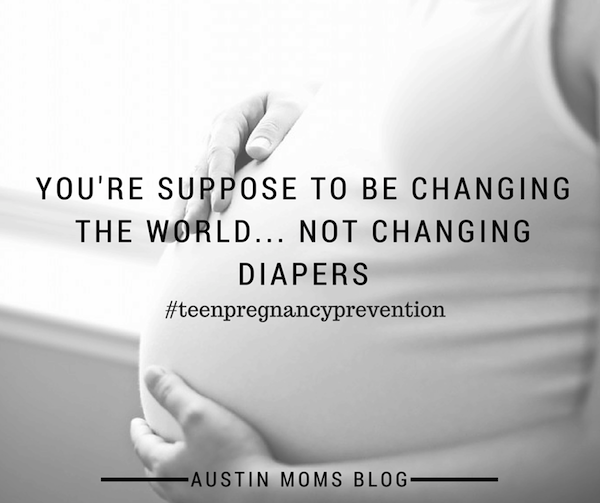
May was National Teen Pregnancy Prevention Month, but it’s a problem that plagues teens every day, all year long. This is a theme that attests to the truth that teen pregnancy is still worrisomely prevalent in the USA. According to the Guttmacher Institute approximately 615,000 teenage girls fall pregnant each year. Teen pregnancy is largely undesirable for a number of reasons, most of which boil down to the facts that teenagers are not usually well-equipped for parenthood and the children conceived will suffer the consequences. So how should a parent go about discussing teen pregnancy prevention with adolescent offspring?
Although my own daughter is only a toddler (phew!) I have already given the issue considerable thought. Why? I became unexpectedly pregnant at age 25 – hardly a teenager but still single and irresponsible and naïve. The shell-shock of my predicament caused me to radically rethink what both popular culture and school health education had taught me about sex and sexuality. What I realized through my process of rediscovery are three hard-learned lessons that every teenager deserves, and needs, to know about preventing pregnancy.
-
“Safe” sex isn’t actually that safe.
It’s definitely safer than no protection at all but it is still possible to get pregnant (not to mention an STD) while using birth control, condoms, or any other form of contraception. Yes, even if contraception is used correctly. I, like so many other countless girls, discovered this the hard way when I fell pregnant despite my ‘best efforts’ not to. I was at once devastated, terrified, and infuriated. I felt cheated and willfully deceived by a culture that told me I was being responsible and “safe.” I did some research and learned that getting pregnant while on contraception is no rare phenomenon like I had supposed. Even just perusing the forums on Babycenter.com provided overwhelming personal accounts of pregnancies conceived while on the the Pill or the NuvaRing or whatever else. Statistics from The American Journal of Obstetrics and Gynecology further confirmed contraception’s troubling failure rates: the pregnancy rate while on the Pill is about 9% per year. With condoms, it is a disturbing 18-21%. Not exactly the best odds for wide-eyed teens.
So please, let your kids know that protected sex involves very real risk. There is always a possibility when using reliable contraception that someone will end up pregnant.
-
Understand and respect sexuality.
I remember resenting the characterization of sex and sexuality in my eighth-grade abstinence education class. I distinctly recall my well-meaning teacher railing at our all-girl class: “Don’t show the small of your back, ladies! Because where does it lead, ladies? Think about it!” I learned that the small of the back was but one of the many female body parts that must not be shown to boys because they would immediately think of sex. I’ve since come to learn that last part wasn’t a total lie, but the way my teacher narrowly depicted sex as a something dark and taboo did not ring true.
Thus, I didn’t buy into the scary condemnation of sexuality for too long. Why? I went away to high-school and I gradually began to suspect what all adolescents do: that sex, mysterious as it still was to me, was also captivating in a way that didn’t seem dark or sinful. My new inclinations felt very at odds with what I had learned in 8th grade, and this made me pretty damn curious to figure out for myself what the hell was going on.
Looking back I wish I’d been taught that my burgeoning sexuality was both natural and healthy. That my attraction to the opposite sex was a natural progression towards adulthood and love and the primordial procreative force that propagates the human race. I wish I’d been permitted, even encouraged, that captivation; then perhaps I would not have felt so compelled to uncover the hidden mystery for myself, way before I was ready.
(On the bright side, however, 2014 statistics from Guttmacher show that teens are waiting longer to have sex than they did in the recent past. Most cited fear of pregnancy or religious/moral convictions as the main reasons for their decision.)
-
Funnel newfound longing for the sensual into other aspects of life.
A study recently published in Archives of Pediatrics and Adolescent Medicine found that a majority of teens, particularly girls, have sex not because they feel psychologically prepared for a mature relationship and potential pregnancy, but rather because of peer pressure and/or desire for intimate connection. I could certainly relate as a teen. The desire to feel completed, alive, nearly consumed me. What I wish I’d known and want other teens to know as well: People say that when teens’ hormones run wild they just want sex. But it’s so much more than that. As sexual impulses gather strength teens’ desires to love and be loved and to connect with other humans evolve accordingly. So help your child to recognize, despite peer pressure and ‘glamorized’ images of teen sex, that sex is but one way to manifest desires for sensuality and fullness.
In fact, findings by the National Campaign to Prevent Teen Pregnancy show that teens actively involved in sports or creative endeavors are less likely to get pregnant. For example, the campaign found that “when girls in poor neighborhoods participate in sports or other physical activities, they report higher levels of self-esteem and wait longer before having sex for the first time.” Whether it to be sports, writing, singing, or any other number of healthy psychological outlets, each serves to funnel teens’ newfound fervor into productive expressions of self.
Voilà. There’s a little of my input, gleaned from much personal reflection and some research, on how to talk to kids about teen pregnancy prevention. I don’t think I have all the answers, and I know that each parent-teen relationship is unique, but I do believe that what I wrote here expounds upon some basic human truths. Well, um, good luck!










Great piece! I definitely agree that teens should be explained to that what they’re feeling is natural. Instead of making it a taboo, dangerous topic not to be discussed. That only distances them from getting the facts and being educated on what they are so curious about.